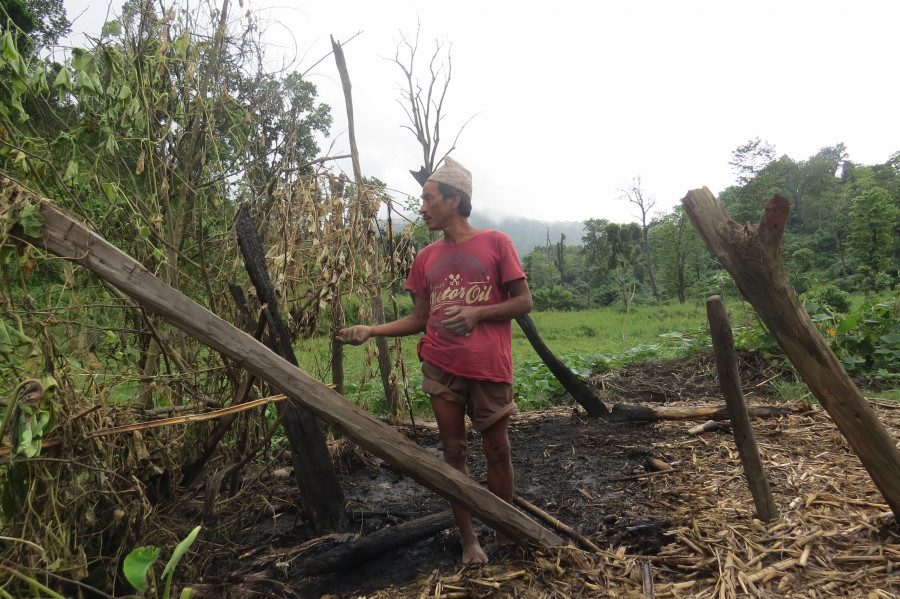National
Rights lawyers move Supreme Court against forceful eviction of landless families
Petitioners have sought government intervention into wanton eviction of vulnerable communities and offer alternative locations for them to live with dignity.
Binod Ghimire
A group of human rights lawyers and activists on Monday filed a writ petition at Supreme Court seeking a directive to stop forceful eviction of landless people from their settlements on government land and national parks without ensuring an alternative place for them to live.
On July 18, Chitwan National Park officials burnt down two huts and destroyed eight others using elephants with an intention of evicting the Chepang families who have been living in Kusum Khola, an area that falls within the national park.
Raju Chapagain, one of the petitioners, said they filed the writ seeking the court’s intervention as there was no stopping in the incidents of forceful evictions from their settlement.
“All tiers of governments are competing to violate the citizens rights to housing. It is imperative that the apex court intervene into the matter,” said Chapagain.
The petitioners have also sought a proper consultation with stakeholders and a study into the consequences before shifting the families living on public land and protected areas to alternative settlements.
“Adequate time and compensation should be in place before their relocation in new places,” reads one of the demands.
Ten families from the indigenous Chepang community, who were living in the Kusum Khola area since 1997, were rendered homeless in the incident and almost all families lost their identity documents, money and other possessions.
The petitioners have also demanded an interim order for an immediate arrangement of alternative settlements to the Chepang people and adequate compensation to the loss of their property and psychological trauma. They have also asked for an intervention from the court for a fair and impartial study and action against the culprits under criminal offence.
“We seek an interim order to stop such activities with an immediate effect as there are chances that all three tiers of government could resort to other forceful evictions,” the petitioners have said in the petition.
The government authorities however, are denying that the residences of the Chepang people were burnt.
Defending the move of the park authority, Minister for Forest Shakti Basnet on Sunday said only the cattle sheds were burnt, not the houses.
Speaking at the meeting of the Law, Justice and Human Rights Committee of Parliament, Basnet said the reports about the park employees resorting to arson and vandalism to get rid of the Chepang families were false.
The committee, however, didn’t buy his argument. It concluded that arson and destruction of the houses using elephants was against the principle of human rights.
“This is against the constitutional rights to housing and individual’s right to live with dignity,” said the committee, directing the government not to evict anyone without arranging an alternative settlement.
The petitioners, comprising 14 lawyers, have also said that despite Article 37 of the Constitution of Nepal ensuring Right to Housing as a fundamental right, all tiers of governments have been found involved in forceful eviction of the people mostly from the marginalised communities.
The Chitwan National Park is a repeat of similar incidents in the past
On May 16, the officials from Bardiya National Park had issued a notice to indigenous Tharu community from Barbardiya Rural Municipality-7 to leave their dwellings within a week, alleging that they had captured the land belonging to the park.
The authority, however, could not evict them following criticism from different quarters. The families of freed Kamaiyas (bonded labourers) have been living in the area since 2006.
Similarly, in June 9 last year the local authority from Butwal Sub-Metropolitan City-1 had bulldozed 16 houses of people from the Muslim community.
In another incident, three families from the Dalit community were chased from the land belonging to Guthi Sansthan in Jananakpur Metropolitan City-12.
“The forceful eviction is not just a blatant attack on the existing domestic laws but also a violation of different international conventions to which Nepal is a party,” reads a point in the writ petition filed on Monday. The decision to evict landless communities, particularly Chepang families, by means of arson and vandalism, especially when the people are already suffering due to coronavirus pandemic and monsoon–related disaster, has drawn widespread criticism.
The National Human Rights Commission on Friday expressed its serious exception to the incident and demanded a fair investigation. The constitutional human rights watchdog has also formed its own investigation committee to bring the fact before the public.
On July 21, Amnesty International Nepal condemned forcible eviction of the indigenous community and demanded that those involved in destroying the settlements are held accountable.
Human rights workers say the idea of socialism envisioned in the statute is all about state’s protection to the people from deprived communities, not forcing them from their homes.
“The government that should be protecting the constitutional rights to housing of its citizens is acting to demolish their settlements without an alternative place for them to live. This is an objectionable act,” Charan Prasain , a human rights activist, told the Post.




 18.12°C Kathmandu
18.12°C Kathmandu














